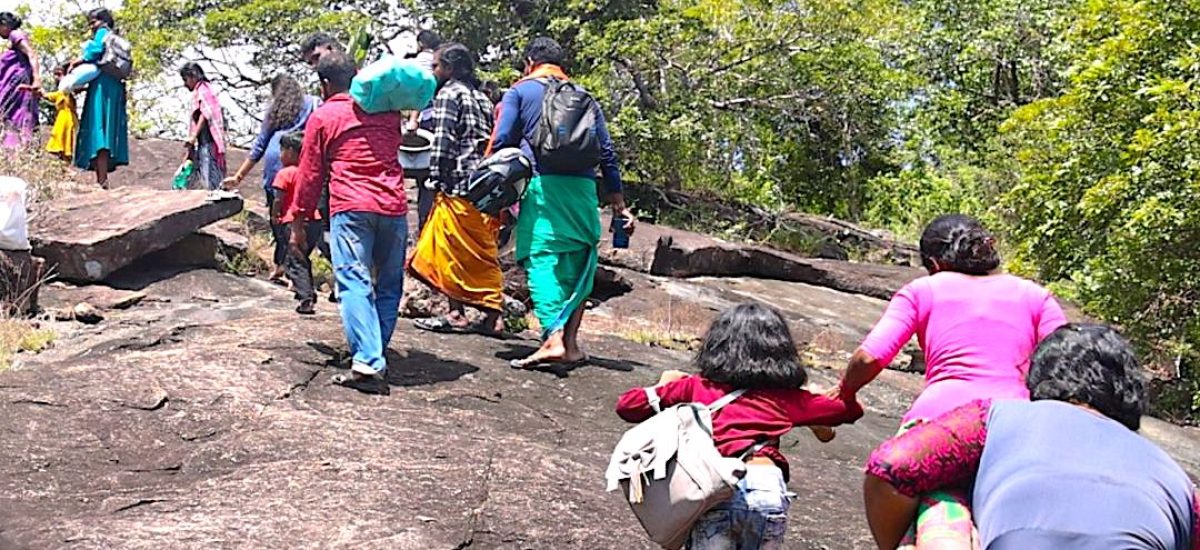Photo by Noopura Liyanage
Kuchchaveli: Changing Landscapes of Trincomalee is a thought provoking documentary produced by the Centre for Policy Alternatives (CPA) that delves into the ongoing land conflicts that continue to plague the North and East regions after the civil war. It serves as a powerful exploration of the enduring impact of state sanctioned land appropriations on Tamil and Muslim communities, who face constant threats unraveling the complex web of displacement, cultural erasure and social injustices that have marked their lives.
Bhavani Fonseka, Senior Researcher and Lawyer, recalls working with the CPA on the documentary Sampur in 2016. This explored the issue of reclaiming homes in Sampur and the challenges that people faced in returning back to their land after the war. During this production, Kuchchaveli came up as an area that had potential triggers for conflict. Comparing Sampur and Kuchchaveli, land grabs that were previously made for military purposes are now being done in the name of preserving national heritage.
The documentary was made to address the information gap between what is known in different parts of the country and what is the lived reality. In an attempt to redress the balance, Fonseka stresses, “There is a dominant narrative and a narrative that often gets forgotten.”
A series of first hand interviews and archive phone footage paint a vivid picture of the challenges faced by minority communities as they grapple with the loss of their ancestral lands, sacred sites and cultural heritage. Tamil and Muslim communities watch as their places of religious worship get renamed to Sinhala Buddhist names and they lose access to lands that feed their families. This transformation happens in the guise of the state claiming the protection of heritage but it is part of a pattern where minority lands become majority controlled. For them it is not just an economic loss, it is an issue of identity and survival. Their stories serve as poignant reminders of the deep-rooted struggles and resilience of these communities in the face of adversity.
In 2024, a Muslim burial in Ponmalaikuda was disrupted by a Buddhist monk, accompanied by members of the Special Task Force, who claimed the burial site fell within temple grounds. Although the burial ultimately proceeded, the confrontation resulted in the police filing eight legal cases against members of the local Muslim community.
The Sembheeshwarar Shivan Kovil, a Hindu temple, was renamed Chethiyagiri Viharaya by the Department of Archaeology. During the limited times when visits are allowed, armed military personnel are deployed around the site, creating an intimidating atmosphere in a place meant for religious worship.
Manikkarasa, the son of a Hindu priest, now performs rituals by a roadside stone after the Valathamalai Kovil where he and his community once worshipped was taken over by the Archaeology Department, reportedly with the support of a Buddhist monk. The temple site has since been converted with Buddhist flags now flown there, effectively restricting access to Hindu devotees.
In Thennamaradavi, the Kandaswami Kovil has been renamed Sankamale Purana Raja Maha Viharaya, and Hindu worshippers are now prohibited from entering. This restriction is enforced by police, military and Special Task Force personnel. Even during major Hindu festivals, ceremonies have been halted by security forces, citing the site’s designation as an archaeological preserve.
The Department of Archaeology has also expanded its control over agricultural lands traditionally cultivated by Tamil and Muslim communities. Citing heritage preservation, these land acquisitions have disproportionately affected areas where Sinhala Buddhists make up less than 5% of the population. Buddhist monks often lead these efforts and the seized lands are frequently redistributed to Sinhalese farmers. Meanwhile, Tamil and Muslim landowners are denied access to lands they have long relied on for their livelihoods.
The documentary highlights the systematic takeover of agricultural lands and the suppression of religious practices, underscoring the insidious nature of institutional biases and state actions that perpetuate injustice and marginalisation. The narrative of the documentary unfolds with a sense of urgency and empathy, urging viewers to confront the uncomfortable truths of land dispossession and cultural appropriation that have long plagued these communities.
The message of the documentary is a rallying cry for social justice, inclusivity and human dignity. It challenges audiences to reevaluate prevailing narratives and policies that prioritise one community over others and invites them to reflect on the enduring struggles faced by minority communities in the North and East. The cinematography captures the stark beauty of the landscapes and the haunting presence of militarisation, serving as a powerful backdrop to the narratives of loss, resilience and hope.
Kuchchaveli demonstrates the strength, courage and unwavering spirit of communities striving to reclaim their land, livelihoods and cultural heritage in the face of formidable challenges. It is a call to action, a plea for solidarity and a reminder that the fight for justice and equality must continue, no matter the obstacles. A woman displaced from her homeland vows, “No matter how many generations pass, we will not give up our struggle.” The documentary stands as a powerful and urgent reminder of the need to amplify marginalised voices, challenge entrenched power structures and work towards a more equitable and compassionate society for all. Kuchchaveli asserts that what is needed now is a clear and impartial review of policies that clearly prioritises one community over others.
See the documentary here: https://youtu.be/O7pxL1OUKb0

